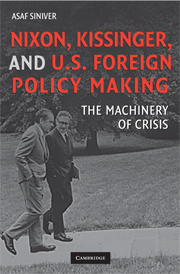Book contents
- Frontmatter
- Contents
- List of Figures
- Acknowledgments
- Abbreviations
- Dramatis Personae
- Nixon, Kissinger, and U.S. Foreign Policy Making
- Introduction
- 1 Structures, Processes, and Personalities in U.S. Foreign Policy
- 2 The Making of U.S. Foreign Policy During the Nixon-Kissinger Years
- 3 The Incursion into Cambodia, Spring 1970
- 4 The Jordanian Crisis, September 1970
- 5 The India-Pakistan War, December 1971
- 6 The Yom Kippur War, October 1973
- Conclusion
- Bibliography
- Index
- Plate section
- References
6 - The Yom Kippur War, October 1973
Published online by Cambridge University Press: 17 August 2009
- Frontmatter
- Contents
- List of Figures
- Acknowledgments
- Abbreviations
- Dramatis Personae
- Nixon, Kissinger, and U.S. Foreign Policy Making
- Introduction
- 1 Structures, Processes, and Personalities in U.S. Foreign Policy
- 2 The Making of U.S. Foreign Policy During the Nixon-Kissinger Years
- 3 The Incursion into Cambodia, Spring 1970
- 4 The Jordanian Crisis, September 1970
- 5 The India-Pakistan War, December 1971
- 6 The Yom Kippur War, October 1973
- Conclusion
- Bibliography
- Index
- Plate section
- References
Summary
This has been the best-run crisis since you have been in the White House.
Kissinger to Nixon, 17 October 1973The making of U.S. foreign policy during the Yom Kippur War in October 1973 was distinctly different from the other cases examined in this book. More than any other international crisis during the Nixon years, this one was invariably influenced by domestic politics. The fourth Arab-Israeli war that began on 6 October and lasted for nearly three weeks coincided with a series of domestic crises in Washington which directly impinged on the president's ability to fully commit himself to foreign policy making. On 10 October, Vice President Spiro Agnew resigned and pled nolo contendere to charges of tax evasion and bribery. Two days later, the U.S. Court of Appeals ordered Nixon to release a series of White House tapes to Archibald Cox, the Watergate special prosecutor. On 20 October (while Kissinger was in Moscow negotiating a cease-fire to end the war), the infamous ‘Saturday Night Massacre’ saw the resignations of Attorney General Elliot Richardson and his Deputy William Ruckelshaus, which were then followed by Nixon's dismissal of Special Prosecutor Cox.
In his memoirs, Nixon referred to the debilitating effect of the domestic turmoil on his ability to run U.S. foreign policy and prevent the Soviets from capitalising on the crisis in the Middle East.
- Type
- Chapter
- Information
- Nixon, Kissinger, and US Foreign Policy MakingThe Machinery of Crisis, pp. 185 - 223Publisher: Cambridge University PressPrint publication year: 2008



